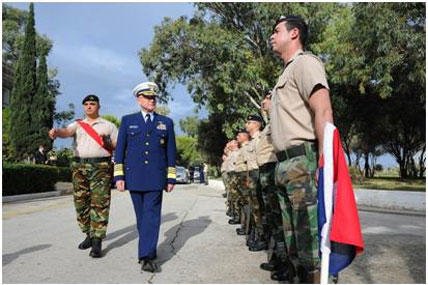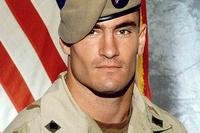Commandant of the Coast Guard Adm. Bob Papp visited Malta last week, kicking off an international trip to meet with partner organizations and visit Coast Guard personnel stationed or deployed overseas. This visit further strengthened ties between the Coast Guard and Malta and underscored many areas of mutual interest.
The commandant commenced the visit to Malta by meeting with Ambassador Gina Abercrombie-Winstanley at the U.S. Embassy in Malta to discuss joint U.S.-Malta search and rescue initiatives, drug enforcement bilateral agreements, the U.S. Coast Guard’s attaché support of the Embassy and Armed Forces Malta’s efforts to counter terrorist travel through at-sea enforcement and cooperation.
“Our continuing efforts to provide opportunities for Malta to share ideas, improve maritime operations, and make the Mediterranean region safe for commerce and recreation are addressing the global challenges all nations face today—including drug smuggling, human trafficking and the transportation of weapons of mass destruction,” said Abercrombie-Winstanley. “Admiral Papp’s visit was an excellent opportunity to reiterate our commitment to working with our partners around the world to counter these problems.”
Meanwhile, Mrs. Linda Kapral Papp toured U.S. government-leased housing in Malta and conducted a focus group with military spouses regarding issues of common concern for families living overseas.
“I’ve been looking forward to this trip to meet with and to hear the perspectives of our overseas family members, the challenges they face, and how we can continue to improve our family programs,” said Mrs. Papp. “I’m very passionate about my role as the Coast Guard Ombudsman-at-Large and will continue to advocate for our Coast Guard families.”
The commandant also visited the Armed Forces of Malta’s Chief of Defence Brig. Gen. Martin G. Xuereb at Malta’s Luqa Barracks. The Armed Forces of Malta’s Maritime Squadron is “coast guard-like” in missions and authorities and the commandant and Xuereb discussed several items of ongoing mutual interest, including search and rescue and what is referred to in Malta as irregular migrant/refugee interdiction.
Malta’s location in the south-central Mediterranean Sea makes it a prime first point of landing for northbound irregular migrants or refugees desiring to enter the European Union from North Africa. Once irregular migrants or refugees successfully enter the European Union it is easier for them to enter the U.S. The Coast Guard is assisting Malta in procuring boats and helicopters to help counter this shared threat.
Coast Guard Training Center Yorktown and the American Embassy assisted the Armed Forces of Malta in establishing its Search and Rescue Training Centre, which was renamed the Maritime Safety and Security Training Centre in 2009 due to the expanded emphasis on maritime security. The center trains Armed Forces Malta members in search and rescue, operational maritime law, and maritime law enforcement. Since it opened in 2004, the center has become an internationally renowned center of excellence for search and rescue and has trained students from more than 28 countries in Europe, Africa and the Middle East.
The Coast Guard and Malta further solidified their strong connections by signing a search and rescue memorandum of understanding in 2009. This MOU affirms close cooperation in search and rescue operations and training and makes Malta the only country without a search and rescue region contiguous to the U.S. to have such an MOU with the Coast Guard.
During the visit to Luqa Barracks, Master Chief Petty Officer of the Coast Guard Michael Leavitt met with Force Sergeant Major Warrant Officer Class 1 Geoffrey Muscat and Chaplain of the Coast Guard Capt. Gary Weeden met with Father Joe Melli, their respective Armed Forces Malta counterparts to discuss common issues.
The commandant’s visit to Malta culminated in a visit to the International Maritime Law Institute to address their 32 students from 23 countries enrolled in the one-year program. The Institute works to develop legal infrastructure inside developing nations by building up a base of lawyers trained in maritime law and how to adopt international maritime law into domestic legislation.
The commandant’s remarks explored how maritime countries have an increasing emphasis on a “governance of the sea” approach in contrast to the traditional “control of the sea” approach to ensure safety, security and prosperity. The commandant explained that in today’s interconnected world with complex maritime economic, legal and sovereignty issues, agencies with these related authorities will have increasing prominence and the U.S. Coast Guard can serve as a model.
“It was an honor to discuss operational maritime law issues with the students who embody the institute’s motto ‘Serving the Rule of International Maritime Law,’” said the commandant. “When the students graduate and return to influential positions in their home country, I’m certain that Coast Guard officers will be among their close colleagues as they work together to implement International Maritime Organization standards worldwide.”





























